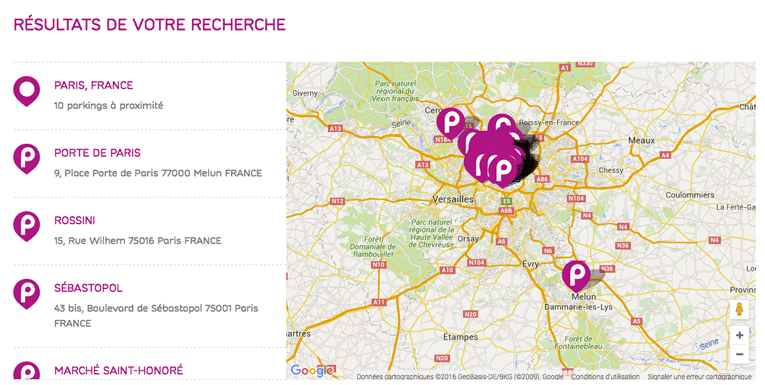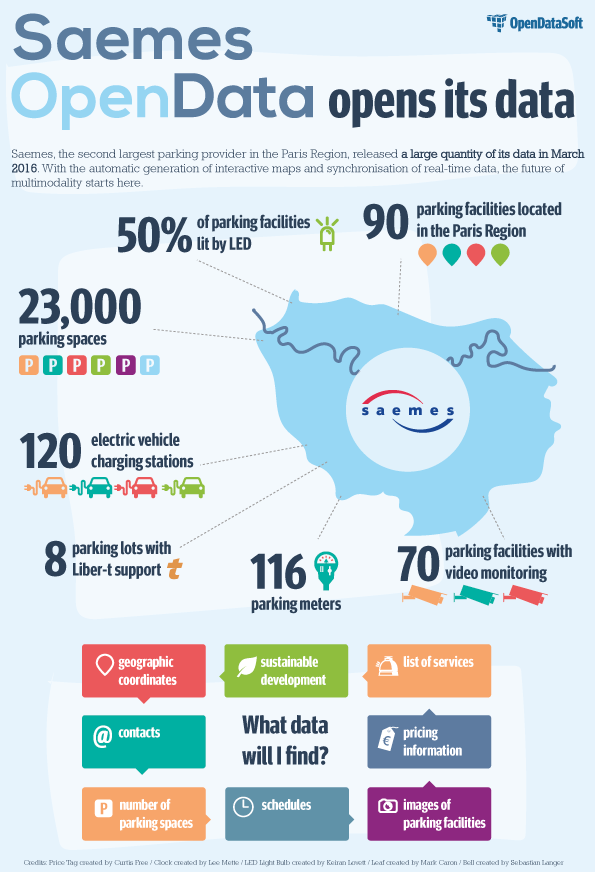How Open Data Can Improve Parking Solutions
Saemes, the second largest parking provider in the Paris Region, recently became the first parking provider to open up its data. Looking at its new open data portal, we wanted to see if the company would succeed in improving parking using open data (hint: it can). Off we go!

Following our project to interconnect open data portals around the world, our team set out on a new adventure. Saemes, the second largest parking provider in the Paris Region, recently became the first parking provider to open up its data. Looking at its new open data portal, we wanted to see if the company would succeed in improving parking using open data (hint: it can). Off we go!
Geolocating Parking Facilities and Parking Spaces On the Road
Looking for a parking space can be a trying experience, especially in large cities. One often falls upon restricted spots, narrow streets, full lots, among other challenges. The search for the perfect parking space needs some innovation.
While the geolocations of numerous parking facilities are freely available, its raw data generally is not. The data is often embedded on a map within a mobile-unfriendly website, which cannot be used while driving.
Please remember: looking at a map on your mobile phone while driving is dangerous.

An example of an embedded map; it’s hard to read this while moving.
Finally, geolocalized data is seldom shared by parking providers in open and standard formats. Thus, it is hard for developers to get exhaustive, reliable, and up-to-date data. What if operators used open data to improve parking?
From Static Data to Dynamic Data
Open data related to parking can generally include: basic information, GPS coordinates, services, payment methods, rates, schedules, availability of electric vehicle chargers, accessibility for persons with reduced mobility, and air quality information.
With the spreading of sensors, parking providers will soon be able to measure the percentage of a parking facility occupied in real time. Thanks to platforms built to bring value to data, parking providers will be able to instantly transmit this information to their partners (and to the rest of the world). It will then be possible to develop applications to notify the passengers of a vehicle that there is a parking space available right next to them. All in all, users will save valuable time.
Number of parking spaces dedicated to persons with reduced mobility by district (Saemes data)
Customized User Services
Systemic customization of user service is a new vector of innovation. The creation of data repositories – loaded with metadata, images, video streams, audio capture, and more – will give users a service that is increasingly responsive to their needs. By opening these repositories in interoperable formats, such as APIs, operators will allow for the development of increasingly relevant applications.
A user with reduced mobility will be able to find accessible infrastructure. Subscribers to the automated toll-road payment system ‘Liber-T’ will know instantly that they can pay for parking via this service.
An example of a comprehensive and open repository
Putting the Open Data Streams from Various Providers into APIs
Of course, those network effects will only take place when all the players take part. Beyond the creation of data repositories, it is important to think about how they will be shared, using either visualizations, widget libraries, standard formats of files, RESTful APIs, etc.
APIs grant developers a key tool to access the data. Thanks to APIs, developers can build applications in which the data is always up-to-date. A parking garage is suddenly full? All the application connected to an API from Saemes’ open data portal will indicate the change.
Saemes: The First Parking Provider Using Open Data to Improve Parking
Saemes, the second largest parking provider in the Paris region, opened its Opendatasoft-powered open data portal dedicated to parking data back in March. Saemes has since unlocked the data on 90 parking facilities in the Paris region (that is 23 000 parking spaces). Check out the data available in the infographic below.




